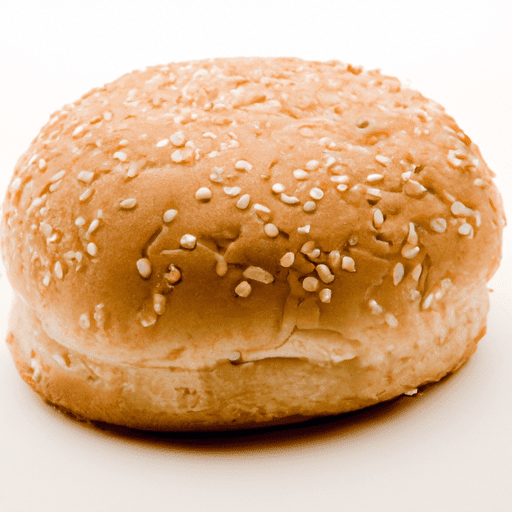Sesame Seed Burger Buns: The Perfect Addition to Your Homemade Burgers
Sesame seed burger buns have become a staple in many households and burger joints around the world. The delightful combination of a soft bun with the nutty flavor of sesame seeds not only adds a visual appeal but also enhances the overall taste and texture of your favorite homemade burgers. In this blog post, we will explore the diverse aspects of sesame seed burger buns, including their taste, common uses in cooking, nutritional value, and some interesting historical facts.
The Taste and Texture of Sesame Seed Burger Buns
Sesame seed burger buns are often praised for their unique taste and texture. The addition of sesame seeds to the buns creates a slightly nutty and savory flavor that complements various burger fillings. These buns have a soft and fluffy texture, making every bite of your burger an absolute delight.
Common Uses in Cooking
Sesame seed burger buns can be a versatile addition to your culinary creations. While they are a popular choice for burgers of all kinds, their uses extend beyond that. They can also be used to elevate sliders, sandwiches, or even as a base for mini pulled pork or barbecue chicken sandwiches. The nuttiness of sesame seeds pairs well with both savory and slightly sweet flavors, giving you endless possibilities in your cooking endeavors.
Nutritional Value of Sesame Seed Burger Buns
Sesame seed burger buns not only add flavor and texture to your burgers but also offer some nutritional benefits. While the exact nutritional content may vary depending on the specific brand or recipe, sesame seed burger buns often provide essential nutrients such as:
- Fiber: Sesame seeds and whole wheat buns can contribute to a higher fiber content, promoting digestion and overall gut health.
- Protein: Sesame seeds contain a good amount of protein, which can aid in muscle development and repair.
- Vitamins and Minerals: These buns can also contain various vitamins and minerals like calcium, iron, magnesium, and vitamin E, contributing to a balanced diet.
Remember, moderation is key, as burger buns are typically higher in calories and carbohydrates. However, opting for whole wheat or whole grain varieties can provide additional nutritional value.
Interesting History and Facts
Sesame seed burger buns have a rich history rooted in various culinary traditions. Sesame seeds themselves have been cultivated for thousands of years, dating back to ancient civilizations in India, Egypt, and Mesopotamia. They were highly valued for their oil, flavor, and medicinal properties.
The sesame seed bun as we know it today gained popularity in the late 19th century. It was introduced by European immigrants in the United States who brought their culinary traditions with them. These immigrants combined their love for bread-making with the availability of sesame seeds, creating a unique and flavorful bun that quickly gained recognition.
Fun fact: The popularity of sesame seed burger buns saw a significant rise in the 1950s with the rapid growth of fast-food chains, particularly in the United States. Today, they remain a beloved choice for homemade burgers as well as those enjoyed at restaurants and food trucks worldwide.
Conclusion
Sesame seed burger buns are undoubtedly a delightful addition to any burger aficionado’s repertoire. Their nutty flavor, soft texture, and versatility in cooking make them a popular choice. Whether you’re enjoying a classic cheeseburger or experimenting with unique burger creations, these buns will add an extra layer of deliciousness to your culinary endeavors. So, why not give sesame seed burger buns a try in your next burger masterpiece?
Origin: Sesame seed burger buns, also known as sesame buns or sesame seed rolls, have a diverse origin. Sesame seeds, an ancient oilseed crop, are believed to have originated from the African and Indian regions of the subcontinent dating back to 3000 BCE. The sesame plant came to the Mediterranean region via trade routes, and it was Greek and Roman civilizations that introduced sesame seeds to Europe.
Common uses: Sesame seed burger buns are a popular choice for sandwiching hamburgers, veggie burgers, or other patty options. They are used in fast food chains, casual dining restaurants, and homemade burger recipes. The seeded version adds a distinct nutty and slightly sweet flavor, enhancing the overall taste texture of the burger.
Nutritional benefits: Sesame seed burger buns provide several nutritional benefits. They are a good source of dietary fiber, offering around 3 grams per bun, contributing to digestive health. Additionally, sesame seeds are rich in healthy fats, including monounsaturated and polyunsaturated fats, which are beneficial for heart health. They are also a source of essential minerals such as calcium, magnesium, and iron. However, specific nutritional content may vary depending on the recipe and brand of the bun.
Unique properties and historical significance: Sesame seeds have been valued for their culinary and medicinal properties throughout history. In ancient Mesopotamia, sesame seeds were used to make flour and oil, while the Egyptians used them as a medicine and a flavoring ingredient. The Assyrians would mix sesame seeds with honey to create a snack similar to modern halva. In Chinese folklore, sesame seeds were associated with immortality, and their oil was used in traditional medicine. Outside of their historical significance, the tiny seeds add an appealing visual appearance and a delightful crunch to the burger bun, elevating the overall dining experience.




Use the share button below if you liked it.
It makes me smile, when I see it.